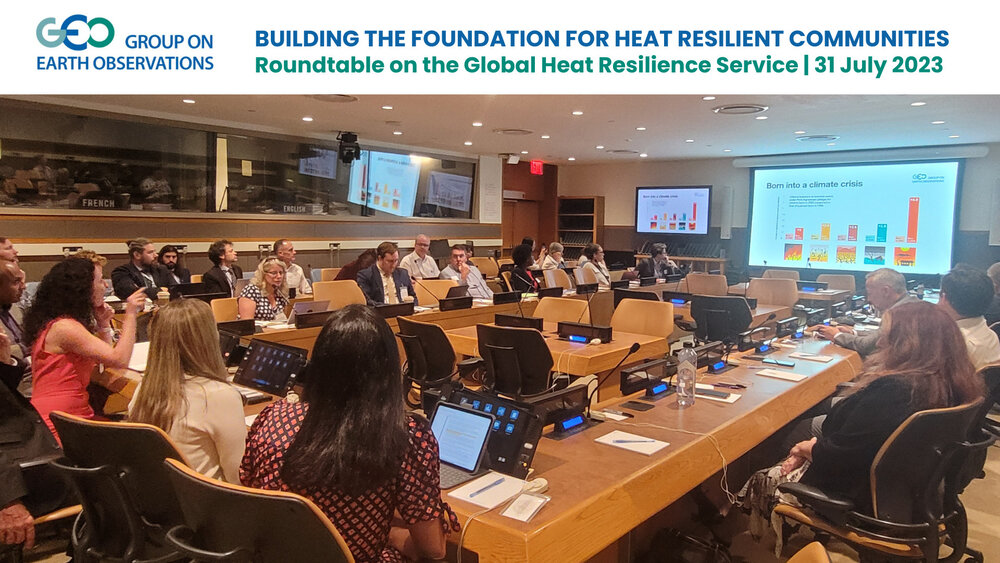Heat Resilience Roundtable a Success: Participants Build Foundation for Progress

On 31 July, in New York City, GEO Secretariat Director Yana Gevorgyan hosted a side event to the Thirteenth Session of the United Nations Committee of Experts on Global Geospatial Information Management (UN-GGIM). We presented our initial plans to develop a Global Heat Resilience Service with a goal of providing every urban area in the world with intelligence on the health risks from exposure to extreme heat. These insights will help cities develop plans to adapt to heat and reduce its impact on health and local economies.
The timing of our roundtable discussion, “Building the Foundation for Heat Resilient Communities," at the end of the hottest month ever recorded on Planet Earth, was not lost on participants.
We had three goals:
- Validate the need for such a service;
- Solicit input on the minimum requirements for a project like this; and
- Identify partners who are willing to help implement this project.
As our secretariat director says in the video, the event was a success.
Stefan Schweinfest, Director of the United Nations Statistics Division, offered opening remarks, saying in part, “I’m very excited about this project and looking forward to learning more about it and how we can contribute.”
Jainey Bavishi, Deputy Administrator of the United States’ National Oceanic and Atmospheric Administration said “I’m looking forward to hearing what NOAA and NIHHIS can do to ensure we do our part in making the Global Heat Resilience Service a reality. We at NOAA want to be as helpful as we can to accelerate these efforts.”
Vicki Cerullo, Acting Executive Director of the New York City Mayor’s Office on Climate and Environmental Justice said,"[I'm] Looking forward to the continued collaboration of this group and the role data can play in our shared solutions in communities across the globe."
Other featured participants included Priscilla Idele, Chief of the Population and Development Branch of the United Nations Population Fund and Tyler Radford, founder and principal advisor for Let’s Envision!.
We had over forty participants at the roundtable including a range of policymakers, geospatial information management experts, statisticians, development organizations, researchers, and practitioners.
By the end of the meeting, the need for this work was validated by both the keynote speakers and participants. There was general agreement that we need to better understand the impact of being exposed to extreme heat. We received valuable input on the minimum requirements for the project and offers of support to help make the Global Heat Resilience Service a reality.
Our next steps will be to identify individuals, organizations willing to help design and implement the project—ensuring that cities are at the heart of that conversation—keeping in mind guidance offered by the participants in last week’s meeting:
- We need to adopt a phased approach to testing, refining and scaling up the model to ensure it meets user needs.
- We need to work with public health specialists to ensure that health impacts are accurately defined.
- We need to build the project on a strong foundation of locally specific, globally relevant data..
- We need to incorporate local data and information.
- We need a modular approach to understanding risks in order to match local capacity.
- We need to consider the legal requirements for interoperability and licensing data.
- We may need to consider support for cities to translate evidence into policies, plans and projects.
This was just the first of several formal discussions around the Global Heat Resilience Service. We look forward to additional input at the GEO Week and Ministerial Summit in Cape Town, South Africa (6-10 November) and a follow-up convening in Q1 of 2024 as we further develop the technical design of the project and build the implementation strategy. We will share more details on that event once they become available.
Individuals representing or affiliated with these organizations / institutions attended the Roundtable
- Brazilian Institute of Geography and Statistics
- Carleton University of Canada
- City University of New York (Earth and Environmental Sciences)
- Columbia Climate School, Columbia University
- ESRI
- Eurographics
- Eurostat
- F.A.O.
- Global Marketing Insights, inc.
- Humanitarian OpenStreetMap Team
- LetsEnvision!
- Location international
- MapAction
- Ministry of Natural Resources, China
- National Oceanic and Atmospheric Administration
- New York City Mayor’s Office of Climate & Environmental Justice
- NYU Marron Institute
- Ordnance Survey
- PLACE
- UK Foreign, Commonwealth and Development Office (FCDO)
- UN Development Programme
- UN Global Geospatial Information Management
- United Nations Office for Outer Space Affairs
- UN Youth Office (OSGEY)
- United Nations Population Fund
- United Nations Statistics Division
- World Geospatial Industry Council
- World Resources Institute